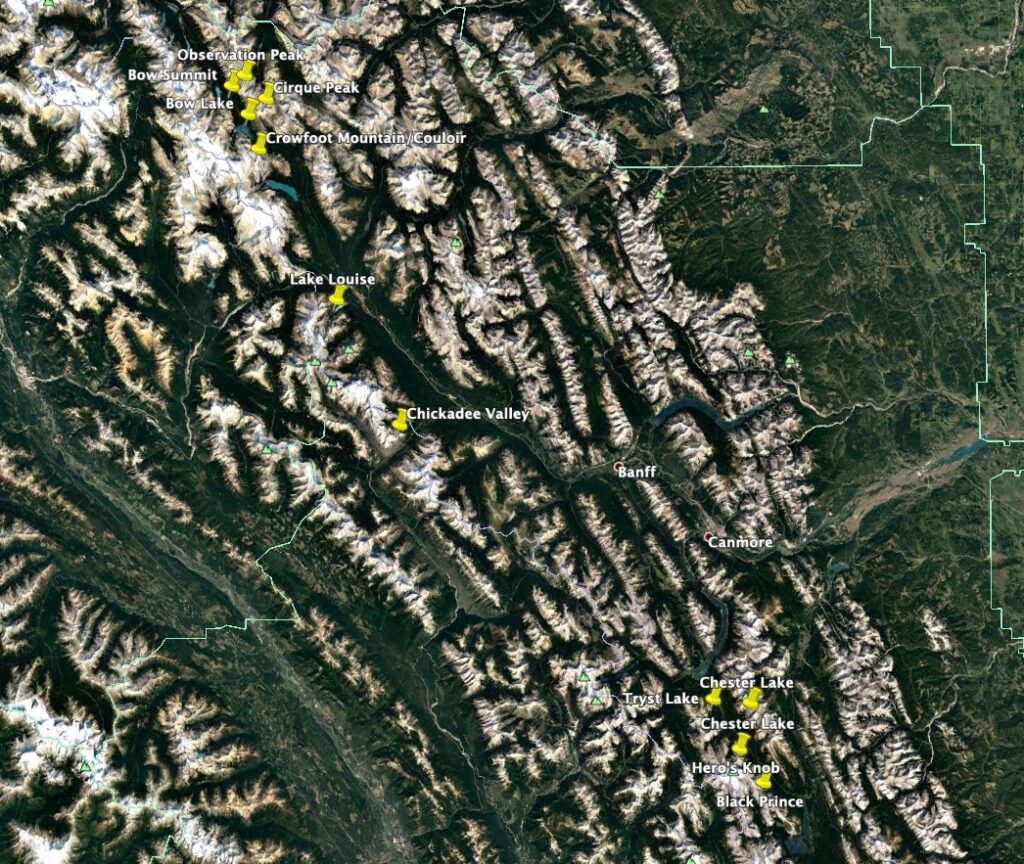- About the ACC
- Membership
- Huts
- Adventures
POLICIES & INSURANCE
- COMMUNITY
- Environment
- Shop
- Give
Eyeing the untracked powder beyond the resort boundary, but not sure how to transition to the backcountry safely and responsibly? Our entry level ski & splitboard course is designed for you! Whether it’s deciding where to ride, assessing the snowpack or understanding the gear, our highly trained and experienced ACMG guides will show you the way. A included copy of the ACC’s Winter Backcountry Leader Manual will provide valuable reference material once you’re ready to go it alone.
Our fantastic location in Canmore, AB, gives access to the perfect learning environment in nearby Kananaskis and Banff National Park. For those coming from further afield, enjoy our convenient on-site, award winning hostel accommodation for a modest additional fee.
BOOKING INFORMATION
Date:
Field Days:
January 4TH-5TH 2025
Price: $500+ TAX
MORE INFORMATION
Please try to register online before calling. If you are having issues please try to have your emergency contact information and course questionnaire filled out before calling.
OR Call: (403)-678-3200 ext 213
Backcountry Skiing Hazards
What are the risks
Hazard Mitigation
Hazard Mitigation
Hazard Mitigation
Hazard Mitigation
The main focus of this course is giving you the tools you need to start exploring the backcountry independently. Key topics of learning will include:
Although some aspects of avalanche safety will be touched on, this is not a specialized Avalanche Safety Training course (which we would recommend taking in addition to this course). Our guides will be as accommodating as possible to each individual’s unique goals and requirements so feel free come armed with specific questions or learning requests.
Participants meet online at 6:00 pm MST via a zoom link sent out 1-2 weeks before course starts. This pre meeting will break down the basic trip planning needed for a winter backcountry outing: research and resources, trip planning, weather considerations, hazard evaluation, difficulty assessment, basic backcountry gear systems, emergency gear, and clothing layering systems.
The session will last around one hour with the primary goal of going over gear so everyone feels ready when meeting on the first field day.
Meet at Commonwealth Creek Parking (Kananaskis) at 9 AM (MST).
This camp is designed for those who have little to no backcountry experience. However, an intermediate level of ski experience at a resort is essential – you must be comfortable on ungroomed blue runs and you will have a better time on the course if you have some experience skiing with a daypack (30L) and skiing varied terrain and conditions.
You will spend almost all day outside (up to 8 hours), sometimes stopping for discussion or breaks. Come prepared for cold weather with warm layers and please read the gear list carefully making sure you have everything. It is imperative that you have a basic level of fitness to allow for access and learning.
If you have any questions about your suitability for this course, please contact the office before registering.
To keep the cost of this camp as low as possible for you, food is not provided on this camp. Be sure to bring along a packed lunch and your favourite snack to fuel the field day!
Accommodation is not included in this course.
Our dedicated on-staff Ski Guide Doug Latimer oversees all of our winter introductory programs. Doug has almost 20 years of experience in teaching AST and other winter instructional courses, as well as in developing course materials and ski guiding. We are extremely excited to have him on board for a third season after rave reviews in previous seasons.
We want to provide the best possible learning experience and give you maximum opportunity to ask questions. So participant-to-guide ratios will be kept below a maximum of 6:1.
The ACC hires guides certified by the Association of Canadian Mountain Guides (ACMG). Visit the ACMG website to learn more about what they do!

If you don’t have everything on the gear list and aren’t ready to invest in your own, there are many awesome local businesses that rent out all of the equipment you will need. Be sure to reserve your rentals ahead of time to make sure everything you need is available for you when you need it.

We sell Tugo® Travel Insurance suitable for both ACC Adventures and personal trips:
INCLUDED WITH YOUR CAMP FEE
PARTICIPANTS MUST PROVIDE
ORGANIZING FANTASTIC ACC ADVENTURES FOR OVER 100 YEARS
Input your search keywords and press Enter.